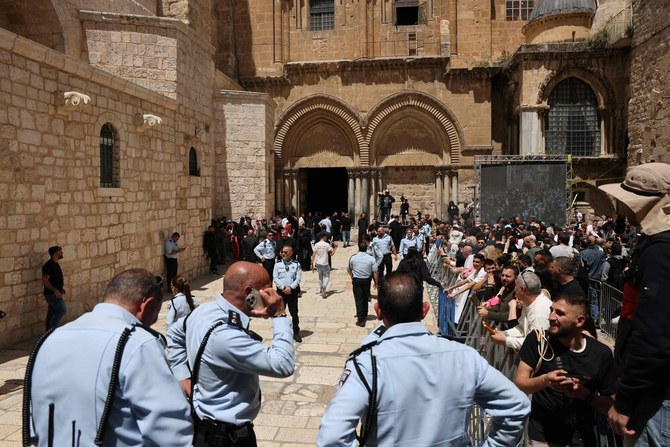RAMALLAH: Israeli police have been criticized for heavy-handed tactics after hundreds of Orthodox Christians were blocked from celebrating Holy Saturday in a church in the Old City of Jerusalem.
Several Coptic Orthodox priests were targeted in front of the Church of the Holy Sepulchre, according to videos circulating on news websites.
Israeli forces blocked the celebrations with roadblocks and barriers at the gates of the Old City, allowing only small numbers of Christians and those with entry permits to enter.
They also obstructed traffic in Khan Al-Zeit market and assaulted dozens of worshippers trying to cross the checkpoints, local sources said.
The millennium-old celebration usually draws thousands of worshippers to the Church of the Holy Sepulchre, where Christians believe Jesus was buried.
In contrast to previous years, when as many as 10,000 worshippers packed into the church, only 1,800 will be allowed inside this year, with another 1,200 outside. Additional checkpoints around the Old City will also restrict access to the area around the church.
The Palestinian Ministry of Foreign Affairs described it as a “blatant attack on the freedom of worship.”
The ministry condemned what is said was a “flagrant attack on the existing political, historical and legal status quo in occupied Jerusalem and on Israel’s obligations as an occupying regime in Jerusalem.”
These measures “violate international law, international humanitarian law and signed agreements,” it said.
The churches said they would refuse to cooperate with the police restrictions, which they see as part of long-standing efforts to push out the local Christian community.
Some church leaders have voiced concern over what they describe as an environment of impunity in the face of rising acts of violence and vandalism targeting Christians and their properties in Jerusalem.
The supreme presidential committee for Palestinian church affairs called for mass participation of Christians in the Saturday of Light activities, despite Israeli restrictions.
The Holy Sepulchre lies at the heart of the Old City’s Christian Quarter in East Jerusalem.
After hours of anticipation, the ceremony culminates when Jerusalem’s Greek Orthodox patriarch emerges from the sealed empty tomb with a lighted candle, a mysterious act considered an annual Holy Saturday miracle before Orthodox Easter Sunday.
The light is then quickly dispersed among the faithful gathered in the darkened church and outside it.
Israeli police said they were working to ensure safety for participants in the Holy Fire ceremony.
“The safety of all those participating is crucial to the Israel police. Officers are working to assist the flow of participants arriving in large crowds,” a statement said.
Nevertheless, the National Christian Coalition in the Holy Land expressed profound anger and sorrow as the Israeli occupation forces turned Jerusalem into a military barracks and blocked access to the church in an apparent escalation of state-sponsored religious persecution.
Dimitri Diliani, president of the coalition, condemned the oppressive measures, “which flagrantly violate the most basic human rights.”
He said that the world at large “should express deep concern about the racist nature of the Israeli occupation authorities, which manifests these days in religious persecution against anyone who is not Jewish. The National Christian Coalition calls for protecting the rights of all, including Muslims and Christians, in Palestine.”
He added that despite the brutal suppression of the Israeli occupation forces, the coalition “has worked tirelessly over the past week to mobilize as many worshippers and celebrants as possible, challenging the tyrannical restrictions imposed by the Israeli occupation.”
Diliani praised the unified stance taken by the patriarchs and heads of the churches of Jerusalem in rejecting the occupation forces’ decisions and refusing to recognize their authority over the Church of the Holy Sepulchre.
“We will continue to exercise our natural right to worship freely in Jerusalem, regardless of the risks and challenges we face,” he said.
Elsewhere, on Saturday, Israeli police again raided the courtyards of Al-Aqsa Mosque in large numbers and removed banners and flags placed on the Dome of the Rock on Friday.


Israeli police storm Christians heading to Jerusalem church
Short Url
https://arab.news/28qhu
Israeli police storm Christians heading to Jerusalem church

- Several Coptic Orthodox priests were assaulted in front of the Church of the Holy Sepulchre
- Israeli forces blocked the celebrations with roadblocks and barriers at the gates of the Old City
Egypt’s prime minister heads to Washington for Trump Peace Council meeting

- Madbouly is attending on behalf of President Abdel Fattah El-Sisi and is accompanied by Foreign Minister Badr Abdelatty
CAIRO: Egypt’s Prime Minister Mostafa Madbouly headed to Washington on Tuesday to participate in the inaugural meeting of a “Peace Council” established by US President Donald Trump, the cabinet said.
Madbouly is attending on behalf of President Abdel Fattah El-Sisi and is accompanied by Foreign Minister Badr Abdelatty.
© 2026 SAUDI RESEARCH & PUBLISHING COMPANY, All Rights Reserved And subject to Terms of Use Agreement.














